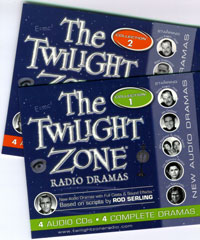
 |
|
| I was seven years old when "The Twilight Zone" first came on TV, and I
watched a lot of it peeking around the bathroom door. It was that scary to
me.
I'm not talking about the doctors and nurses with faces like dogs. Forget the giant cannibal aliens. I'm talking about Rod Serling. That was one scary dude. The black undertaker's suit. That clipped Noo Yawk accent. And the little half-smile, like the uncle who always wanted to tell you a _really_ scary story. Forty years later, I still remember a lot of those stories. Most of them. All right, every one I ever saw. |
 |
|
Carl Amari and Roger Wolski of Falcon Picture Group have produced four sets
(so far) of audio adaptations of "Twilight Zone" episodes, four episodes per
collection. I've had the chance to listen to "The Lateness of the Hour," "A
Hundred Yards Over the Rim," and "A Kind of Stopwatch" from the first
collection. (I have not heard "Mr. Dingle, the Strong.")
(If you want, consider this a "Spoiler Alert." I am not going to worry about revealing details of stories that have been playing in TV reruns since before I learned to drive. Be warned.) Of these three, "Lateness of the Hour" is the standout. Jane Seymour reads the role Inger Stevens had in the TV version; James Keach has the elderly scientist's role John Hoyt originated. Both do an outstanding job, as do the actors who portray the scientist's robot servants. That's a nice piece of work: Sounding non-human, but not so mechanical as to give the game away immediately, but also not all the same. Soundscaping is good and illustrative (all interiors), if not particularly evocative. Music is subtle but very effective. It's not the best script Rod Serling ever turned in (a claustrophobic piece that tried to take advantage of the TV show's changeover to videotape from film), but has a nicely misleading subtheme that distracts the listener from too-quick speculation about Dr. Loren's family situation. (The audio adaptation adds a scene in the scientist's workshop as he shuts down his robot servants that does not appear in the TV production, but fits and is well-produced.) "A Kind of Stopwatch" is an unsubtle comedy piece about a know-it-all bore who comes into possession (in a way not at all adequately explained) of a stopwatch that can halt the passage of time. Lou Diamond Phillips has the lead, sounding not at all like himself, but is as annoying as two hands' worth of fingernails across a blackboard. The script is just a set-up for the last few minutes' payoff: A character who lives to pour words into the ears of an audience -- any audience -- winds up utterly cut off from any audience at all. The theme of isolation is one that Serling often used, as in the far more sympathetic "Time Enough at Last." Soundscaping is good, and the music -- which is present under almost all the dialogue -- builds on the feeling of irritation Phillips's character induces. "A Hundred Yards Over the Rim" is a bit of a disappointment in this company, and I suspect that it may have been the first episode produced. The script is a playing-out of one of my favorite stuck-in-traffic mental exercises: "What if someone from the past could be dropped into the present for a few hours? What would his reaction be?" I think Jim Caviezel -- as "Christian Horn," 1847 wagon train leader who stumbles into a present-day roadside diner -- was making an honest effort to portray a man suffering from malnutrition, dehydration and heatstroke. But his reading stumbles not infrequently, and succeeds more often in sounding -- well, more dim and dull than stressed-out. If there is any pitfall in the "Twilight Zone Radio" concept, it is that the original TV scripts were c. 1960 commercial television scripts, meaning that they had a running time of 23 to 25 minutes. The audio adaptations run 40 minutes without commercials. Adding sixty percent to the length of any script without the result sounding "padded" is difficult. The nature of "The Twilight Zone" story structure -- set-up / application of one bizarre twist / playing out of the consequences / kicker ending -- makes the job even harder. Carl Amari (who I believe did most of the adaptations) does a good job. In some cases -- as with "Lateness of the Hour" -- his additions have added not just time, but flesh to Serling's story. As luck would have it, the first collection did not include any of my favorite "Twilight Zone" episodes, but I'm looking forward to forthcoming releases with anticipation. Ron N. Butler |
|
| As used on this site, the terms audio drama and radio drama refer to
content that contains acting, sound effects and music presented as a dramatic audio
performance. Audiobooks or Books on Tape ™ are usually an audio book that is read
with or without music and sound effects. For a further explanation see this page.
Producers who wish to have their material reviewed should contact audiotheater@spamcop.net
.
|